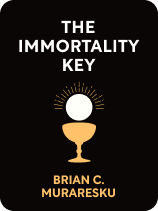

This article is an excerpt from the Shortform book guide to "The Immortality Key" by Brian C. Muraresku. Shortform has the world's best summaries and analyses of books you should be reading.
Like this article? Sign up for a free trial here.
How did Christianity replace Roman paganism and other mystical religions? In what way did the mystical conception of the divine differ from the Christian idea of God?
Christianity didn’t immediately replace the mystical religions that existed at the time of its arrival in the Greco-Roman world. Initially, it existed side-by-side with mystical traditions until the elites, particularly in Rome, decided to establish a hierarchical church within which only the ordained had access to divinity.
Here’s how the rise of Christianity brought about the end of mystical traditions.
Elimination of Mystical Traditions
By the fourth century, religious traditions had become deeply fractured. On the one hand, there were the Gnostic proto-Christians, who were practicing the mystical traditions aligned with the pagan practices; and on the other, there were a growing number of powerful leaders who aimed to establish Christianity as an ecclesiastical tradition. This means the elite, particularly in Rome, wanted to establish a hierarchical church, within which only the leaders had access to power and divinity—this would become Orthodox Christianity. Muraresku says the rise of Christianity meant eliminating two things sacred to the mystical tradition: women and drugs.
Exclusion of Women
One way to ensure the Mysteries couldn’t survive, Muraresku says, was to exclude women from the priesthood or official church leadership. The Mysteries relied on women to prepare the sacrament—it was a knowledge that was considered their domain. So, removing women from leadership positions was crucial for eliminating all traces of pagan customs.
(Shortform note: In 2021 Pope Francis changed some policies to allow women some expanded roles in the church, such as giving readings and assisting priests with Mass. However he, and the Catholic Church as a whole, remain staunch on their policy that women cannot be ordained into the priesthood.)
But, he asks, what happened to the sacramental wine traditions? Where did the knowledge go? And he argues that this issue is at the basis of the long era of witch hunts throughout Europe.
Muraresku says the persecution of women by the church, especially of those with healing and plant knowledge, continued for centuries, and ultimately resurfaced later in the witch trials. He says over time the church systematically exterminated the knowledge of the preparations, not just individuals.
In reference to a document in which the Catholic Church called witches “the most dangerous of all enemies to the human race and the Christian Church,” Muraresku asks how could women cooking up “potions” in their homes be that dangerous to such a massively powerful organization? And he argues that it’s because those potions made people realize they could directly commune with the divine and that would make the church obsolete if people had access to that experience. A record from AD 1320 specifically orders Inquisitors to target those who “abuse the sacrament of the eucharist….by using them or things like them in their sorcery.” Muraresku believes this to be evidence of a longstanding attempt by the Christian church to eradicate the mystical element of the earlier rituals, by suppressing and eliminating women and their knowledge of drugs.
Stigmatizing of Drugs
Muraresku says that mysticism was bad for the social order because it allowed everyone the sacred experience, and emphasized women’s important role in spiritual leadership. This undermined the authority of the Church as well as the patriarchal order. The major problem the powerful elites wanted to eliminate, he says, was that people who “tasted the forbidden fruit” would not submit to orthodox teachings. So, the Orthodox branch of the church persecuted the Gnostics, and the prevailing power structure (backed by the emperor) eventually allowed them to dominate. By the fourth century AD, the Gnostic mysteries had been all but eradicated. At this point, Muraresku believes the original (psychedelic) sacrament was replaced by a placebo, which became the Eucharist as we know it today.
Muraresku also points out that this “anti-drug” campaign has continued throughout the history of the Christian church, not only in the persecution of women but in the colonization of indigenous peoples, as well as being observable in the attitudes of Christianity today toward drugs.
He presents some examples of this to show that the Christian church has an explicit agenda to eradicate mysticism, specifically because it makes people impossible to convert and control. Two key examples of this include:
1) The Aztecs and ololiuhqui: According to Muraresku’s research, ololiuhqui was the most commonly used entheogen (medicinal hallucinogen) by the Aztecs. In a 1629 letter, a Spanish missionary said the Aztecs consult it for gaining knowledge “beyond human understanding.” The priests seized the ololiuhqui and kept people from accessing it, even razing the fields where it was being grown.
2) Native Americans and peyote: Peyote, a psychedelic cactus, has long been used as an entheogen by some Native American tribes. Muraresku tells us that in 1890 the US launched a concerted effort to eliminate it, saying it was “interfering with the work of the missionaries” on the reservations.
These examples are meant to show that the opposition by the Christian church to mysticism, and specifically to mystical experience through psychedelics, is not simply a matter of preference or prejudice. According to Muraresku’s argument, it’s a 2,000-year deliberate effort to restrict the population’s access to a transcendental awareness that might liberate them from the need for scriptural dogma.

———End of Preview———
Like what you just read? Read the rest of the world's best book summary and analysis of Brian C. Muraresku's "The Immortality Key" at Shortform.
Here's what you'll find in our full The Immortality Key summary:
- The secret that kept ancient Greeks and early Christians from fearing death
- The origins of Christianity and its overlap with pre-existing pagan customs
- The real reason why women can't be priests






